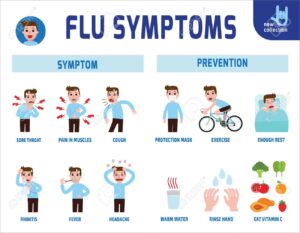Influenza, also known as “the flu,” is a highly contagious respiratory infection caused by influenza viruses. It affects millions of people around the world, causing hospitalizations and, in severe cases, death. When an infected person coughs, sneezes or speaks, respiratory droplets carry the flu.

Common Flu Symptoms:
Flu symptoms usually come rapidly and range from mild to severe. This includes:
- Fever (frequently elevated)
- Cough (often dry and persistent).
- Sore throat.
- Runnyor stuffy nose.
- Body pains and muscular pain
- Fatigue and weakness.
- Headache
- Chills and sweat
- Nausea or vomiting (more prevalent among youngsters)
- Mild versus Severe Symptoms
While many individuals recover within a week, others may have consequences such as pneumonia, bronchitis, or a worsening of underlying health problems.
Flu vs. Common Cold: Methods of Differentiation
| Feature | Flu | Common Cold |
| Onset | Sudden | Gradual |
| Fever | High (100°F+) | Rare |
| Body Aches | Severe | Mild |
| Cough | Dry, Persistent | Mild |
| Fatigue | Severe | Mild |
When to Seek Medical Attention
Seek emergency medical care if you experience:
- Problems breathing, sometimes known as dyspnea
- Chest discomfort or pressure
- perplexity or vertigo
- Persistent fever
- Severe muscular pain or weakness
How to Prevent the Flu
1. Get Vaccinated
The yearly flu vaccination is the strongest defense against influenza.
2. Practice Good Hygiene
Wash hands often with soap and water.
Avoid touching your face.
Use tissues while coughing or sneezing.
3. Strengthen Your Immune System
Maintain a nutritious diet rich in vitamins and antioxidants.
Stay hydrated.
Get enough sleep and handle stress.
How can I know if I have the flu or COVID-19?
The flu and COVID-19 share symptoms such as fever, cough, and tiredness. However, COVID-19 is more likely to result in:
Loss of taste or smell
Shortness of breath.
More significant difficulties, including long-term health concerns Testing, is the best way to distinguish between the two.
Flu Treatment and Home Remedies
- Rest: Allow your body time to recuperate.
- Hydration: Drink plenty of water.
- Over-the-counter medications: pain relievers, decongestants, and cough suppressants.
- Home remedies: warm soups, honey for sore throats, steam inhalation.
- Antiviral medications: These may be essential for severe instances.
Diagnosis and Tests
- Doctors identify the flu through:
- Rapid Influenza Diagnostic Tests (RIDTs)
- PCR Tests (More accurate but take longer)
- Nasal or throat swabs
How Long Will I Get Flu After Being Exposed?
The flu has an incubation period of 1 to 4 days following exposure, and symptoms usually appear rapidly.
How Does Flu Spread?
- Airborne droplets occur when an infected individual sneezes or coughs.
- Surface contact is when you touch a contaminated surface and subsequently touch your
- lips, nose, or eyes.
- Close contact: direct interaction with an infected individual.
Is the flu contagious?
Yes, the flu is extremely contagious, especially during the first three to four days of illness. You can transmit the flu before symptoms develop and up to 7 days after being ill.
How Do I Know If I Have the Flu or COVID-19?
| Symptom | Flu | COVID-19 |
| Fever | High | Often present |
| Cough | Dry, persistent | Persistent, may worsen |
| Loss of taste/smell | Rare | Common |
| Shortness of breath | Rare | Common |
| Body aches | Common | Common |
If doubtful, get tested.
How Do I Manage Symptoms of the Flu?
- Take painkillers like acetaminophen.
- Use a humidifier to aid breathing.
- Gargle with salt water to alleviate sore throat.
Conclusion
Preventing the flu starts with immunization and basic hygiene. Take precautions and, if required, seek medical help if you think you may have the flu. Leave a comment with advice or your flu-related experiences!
FAQs
- Q: Can I contract the flu after receiving a vaccination?
A: Yes, however, the risk of developing a serious illness is lower, and the symptoms are often milder.
- Q: What is the duration of the flu?
A: The majority of symptoms go away in 5–7 days; however, fatigue may last longer.
- Q: Can the flu be cured with antibiotics?
A: No, unless there is a subsequent bacterial sickness, drugs are useless for the flu since it is a viral illness.
- Q: What foods aid in flu recovery?
A: Hydration, citrus fruits, ginger tea, honey, and warm soups can help.
- Q: If I have the flu, can I still work out?
A: It’s advisable to unwind and give your body time to heal before starting an exercise regimen again.
